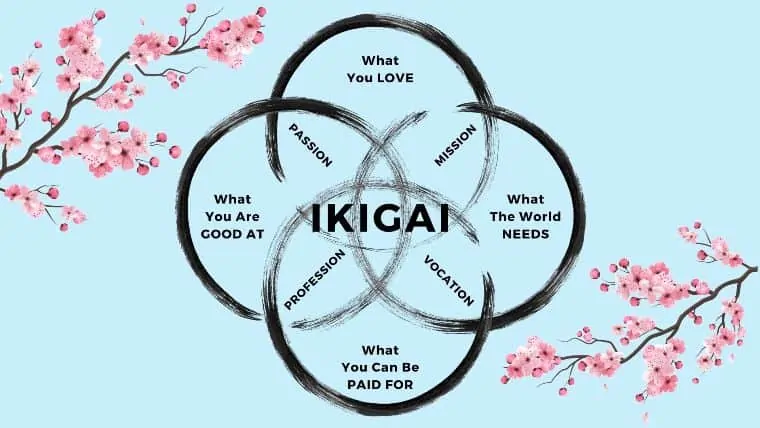Ikigai: Finding Your Reason for Being
In the fast-paced world of modern living, the quest for a fulfilling and meaningful life has never been more pertinent. Amidst the myriad of philosophies and self-help doctrines, one concept from the tranquil shores of Japan stands out: Ikigai. Derived from two Japanese words, “iki” (life) and “gai” (value or worth), Ikigai is often translated as “a reason for being.” It’s a lifestyle philosophy that intertwines passion, profession, vocation, and mission, offering a unique approach to finding happiness and purpose in life.
The Origin and Essence of Ikigai:
The concept of Ikigai has its roots in the Japanese island of Okinawa, known for its remarkable number of centenarians. Unlike the Western pursuit of happiness, which often focuses on individual achievements and material success, Ikigai emphasizes a balanced life that values harmony, community, and a deep sense of purpose. It’s not just about finding what makes you happy but also about discovering what brings value to others. Ikigai isn’t a fixed destination, but rather a continuous journey of exploration and self-discovery. It can evolve throughout your life as your skills, experiences, and priorities change. There’s no single “correct” Ikigai, and the beauty lies in the ongoing quest to find it.
The Four Pillars of Ikigai:
Ikigai is often depicted as the convergence of four primary elements:
- What You Love (Passion): This pillar encourages individuals to explore their interests and what they genuinely enjoy doing. It’s about identifying activities that bring joy and fulfillment.
- What You Are Good At (Profession): This aspect focuses on leveraging one’s skills and talents. It’s about recognizing your strengths and how you can use them to contribute to your work or daily activities.
- What The World Needs (Mission): This pillar emphasizes the importance of serving others and contributing to the greater good. It’s about finding a purpose that aligns with the needs of society.
- What You Can Be Paid For (Vocation): This component addresses the practical aspect of life, ensuring that your passions and missions can also sustain you financially.
The Four Pillars of Ikigai:
Ikigai is often depicted as the convergence of four primary elements:
- What You Love (Passion): This pillar encourages individuals to explore their interests and what they genuinely enjoy doing. It’s about identifying activities that bring joy and fulfillment.
- What You Are Good At (Profession): This aspect focuses on leveraging one’s skills and talents. It’s about recognizing your strengths and how you can use them to contribute to your work or daily activities.
- What The World Needs (Mission): This pillar emphasizes the importance of serving others and contributing to the greater good. It’s about finding a purpose that aligns with the needs of society.
- What You Can Be Paid For (Vocation): This component addresses the practical aspect of life, ensuring that your passions and missions can also sustain you financially.
Finding Your Ikigai:
Discovering your Ikigai is a personal journey that involves introspection and self-discovery. Here are some steps to help you find your Ikigai:
- Self-Reflection: Take time to reflect on what you love, what you’re good at, what the world needs, and what you can be paid for. Write these down and look for intersections.
- Experimentation: Try new things and explore different activities. Sometimes, your Ikigai might be found in unexpected places.
- Feedback: Seek feedback from friends, family, and colleagues. They can provide insights into your strengths and potential areas for growth.
- Balance: Remember that Ikigai is about balance. It’s not just about career success but also about personal fulfillment and contributing to the community.
The Benefits of Living with Ikigai:
Embracing Ikigai can lead to numerous benefits, including:
- Longevity: Okinawa’s high number of centenarians is often attributed to their Ikigai-driven lifestyle, which promotes a balanced and purposeful life.
- Happiness: Finding your Ikigai can lead to increased satisfaction and happiness, as you engage in activities that are meaningful to you.
- Resilience: Having a clear sense of purpose can help you navigate life’s challenges and setbacks with greater resilience.
- Community: Ikigai encourages community involvement and building relationships, which are essential for emotional support and well-being.
Conclusion:
In a world where the pursuit of happiness often leads to fleeting pleasures, Ikigai offers a more holistic and sustainable approach to living. It’s about finding joy in the simple things, contributing to the well-being of others, and living each day with purpose. Whether you’re in the midst of a career change, seeking personal growth, or simply looking for a more fulfilling life, exploring your Ikigai could be the key to unlocking a happier, more balanced existence.














Post Comment